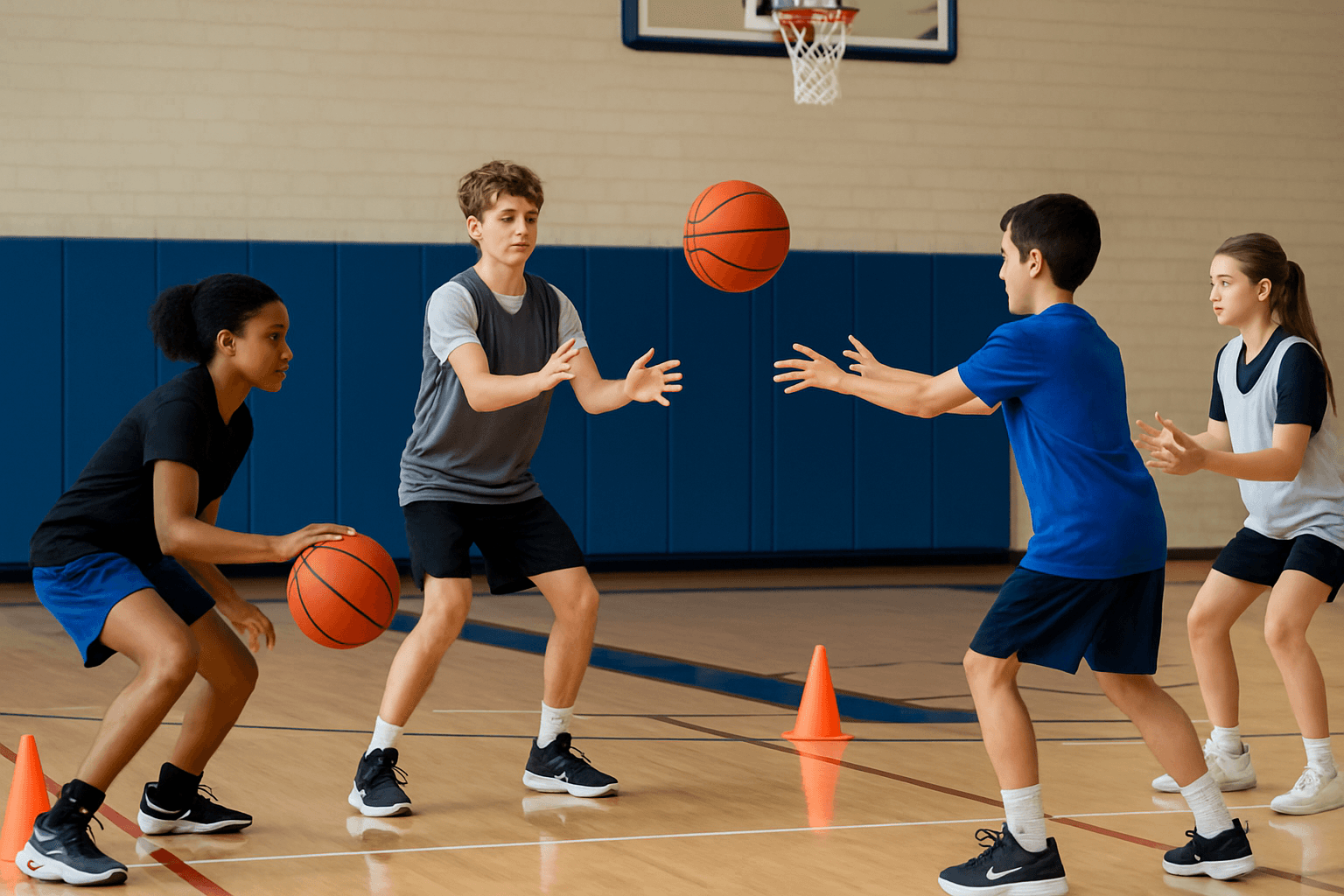
Fundamental Exercises
Players practicing the basics of basketball, including passing and dribbling, during a fundamentals training session.
Basketball Fundamentals: The Building Blocks of the Game
Every great player starts with strong fundamentals. In basketball, fundamentals are the essential skills and habits that allow players to compete at any level. Without a solid foundation, even advanced moves and strategies break down.
This guide explains the core basketball fundamentals, why they matter, and how to develop them through drills and practice.
Why Fundamentals Matter
Basketball is fast, competitive, and full of pressure. Fundamentals allow players to stay calm and effective in any situation.
Benefits of Strong Fundamentals
- Fewer turnovers and mistakes
- Better shooting consistency
- Stronger defense and rebounding
- Smarter decision-making
- More confidence under pressure
What Happens Without Fundamentals
- Missed open shots
- Struggles against defensive pressure
- Poor spacing and teamwork
- Weak defense that gives up easy points
Core Basketball Fundamentals
1. Dribbling and Ball Handling
- Why It’s Important: Lets players control the ball, attack defenders, and keep the offense moving.
- Drills:
- Stationary dribbling (right/left hand, crossovers, behind-the-back)
- Cone dribbling for change of direction
- Full-court zig-zag dribble with defense
2. Passing
- Why It’s Important: Moves the ball faster than dribbling and keeps teammates involved.
- Types of Passes: Chest pass, bounce pass, overhead pass, one-hand push pass.
- Drills: Partner passing, moving target passing, 3-man weave.
3. Shooting
- Why It’s Important: Scoring is how games are won. Good shooters are valuable at every level.
- Keys to Good Shooting: Balance, eyes on target, elbow in, follow-through.
- Drills: Form shooting, free throws, spot shooting, catch-and-shoot.
4. Defense
- Why It’s Important: Great defense wins games and creates easy scoring chances.
- Principles: Stay low, move your feet, keep hands active, communicate.
- Drills: Closeout drill, shell drill, 1-on-1 full-court defense.
5. Rebounding
- Why It’s Important: Rebounds give your team more chances to score and prevent second-chance points.
- Keys: Box out, anticipate the ball, attack the rebound aggressively.
- Drills: Partner box-out drill, rebounding wars, tip drill.
6. Footwork
- Why It’s Important: Good footwork improves balance, shooting, defense, and ball handling.
- Drills: Jump stops, pivots, ladder drills, defensive slides.
7. Communication
- Why It’s Important: Basketball is a team game. Talking helps with defense, offense, and staying organized.
- Examples: Calling out screens, yelling “ball” on defense, letting teammates know you’re open.
How to Practice Fundamentals
Daily Habits
- Spend at least 15–30 minutes daily on fundamentals.
- Focus on quality over speed—form matters most.
Game-Like Reps
- Add defenders and real movement to drills.
- Practice at game speed to prepare for pressure.
Consistency
- Fundamentals aren’t mastered in one week. Improvement comes with repetition and discipline.
Common Mistakes to Avoid
- Skipping the basics. Players who rush into fancy moves without fundamentals struggle later.
- Practicing too fast. Speed comes after control.
- Not using both hands. Weak hand limits options on the court.
- Ignoring defense. Many players focus only on offense and forget defense is half the game.
Final Takeaway
Fundamentals are the foundation of basketball success. The best players—at every level—return to the basics daily. Master dribbling, passing, shooting, defense, rebounding, footwork, and communication, and you’ll have the skills to compete, improve, and enjoy the game for years to come.